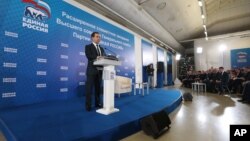Russian Prime Minister Dmitry Medvedev said the country would plunge into a "deep recession'' if the government abandoned its spending plans.
Speaking in Moscow at a party meeting, Medvedev said the government will stay focused on its strategic aims and social spending to avoid the likelihood of sliding into recession.
Medvedev blamed foreign sanctions, saying the country is worse than in the 2008 crisis, because “a number of countries are effectively hampering Russian "development.”
Russia's economy is greatly affected by the steep oil price-drop and is widely predicted to fall into recession next year.
A warning sign is the sharp fall of the Russian ruble, which is the worst performing currency this year, along with the Ukrainian hryvnia.
Standard and Poor's on Tuesday put Russia on "CreditWatch" negative because of the nation's rapid deterioration of its "monetary flexibility and the impact of the weakening economy on its financial system."
S&P's Ratings Services said it expects to resolve the "CreditWatch" placement when its review is done by mid-January. The agency further stated that there is "at least a one-in-two chance of a negative rating action within 90 days."
To prevent a sell-off, Russia's Central Bank has raised the interest rate to 17 percent, which slows the ruble decline but is likely to hurt Russian businesses and individual households.
In an attempt to shore up the ruble, the Russian government published an order on its website Tuesday, instructing gas giant Gazprom, oil companies Rosneft and Zarubezhneft and diamond producers Alrosa and Kristall to reduce their foreign currency assets to October levels and to not raise them until March.
Two of these companies are 100 percent state-owned. Others are state-controlled.
The United States and the European Union have imposed a series of sanctions on Russia over its actions in Ukraine and annexation of Crimea last March.





